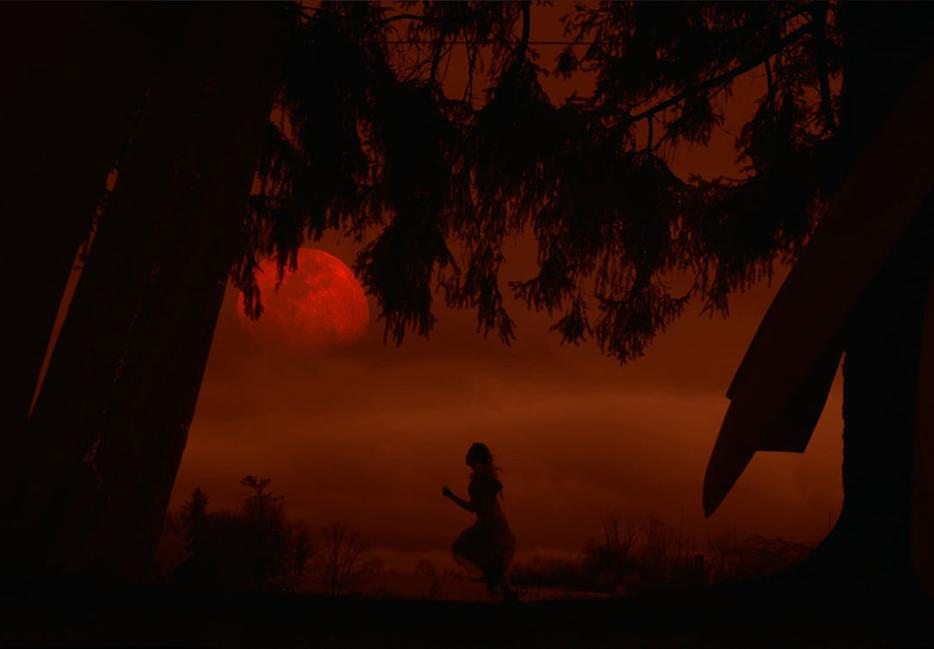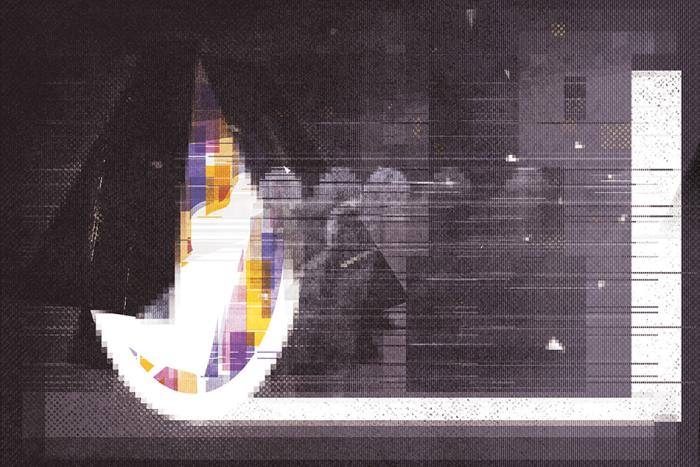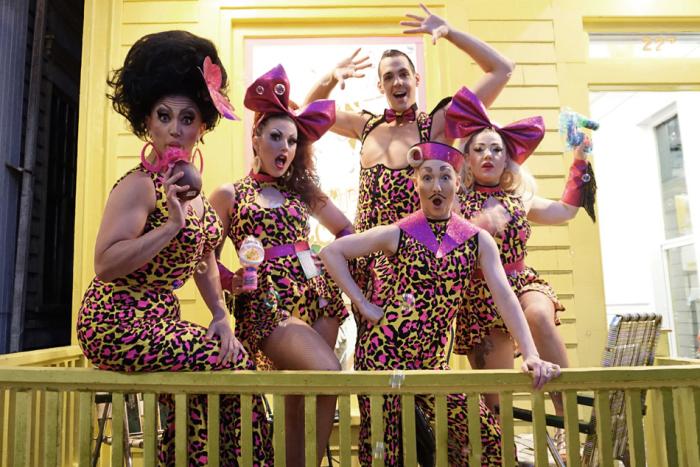It’s been six years since Pontypool vaulted Bruce McDonald into the pantheon of Canadian horror greats. This week he returns with another in the same style: a low-budget, hallucinatory home-invasion slasher called Hellions, arriving in theaters after its premiere at Sundance last January. But horror still seems an odd fit for McDonald—at least among those who know him better for his indefinable ’90s classics, such as the off-kilter road movie Highway 61 or his punk-rock mockumentary Hard Core Logo. It was for these sprawling, vigorous Can-con curios that McDonald earned a reputation as one of the country’s foremost indie directors, a legacy that endures in surviving video stores and in the furthest reaches of late-night TV. For me, McDonald’s opus is Twitch City, the two-season Toronto-centric sitcom he made in the late ’90s for the CBC: a cult object if ever this country has produced one, it remains something of a crown jewel of the national broadcaster.
Hellions enjoyed a special presentation at the Toronto International Film Festival just two weeks before its theatrical release across North America this weekend. We caught up with McDonald during the chaos of the fest to discuss his career and the legacy of his best-known hits.
*
Calum Marsh: I should start by saying I’m a huge fan of Twitch City.
Bruce McDonald: Oh no way! I’m seeing Don, Molly, all of them, weirdly, over the next month.
Working on another season, I hope.
You know, every once in a while we sort of vaguely go, “Wouldn’t it be funny if…,” but nobody’s really seriously thought about it. But you kind of think, why not. Don [McKellar]’s been doing a lot of TV: this show Sensitive Skin and this other show, Michael Tuesdays and Thursdays. They made that show years ago and then brought them back to make some more. And of course, Callum Keith Rennie…
You’ve also been doing mainly TV over the years, yes?
Yeah, I mean, between getting projects ready of our own—I don’t know how other people do it—but I’ve got to live so I’ve got to work. I’m lucky that I get to work in TV and there are lots of different shows that I’ve done. It doesn’t matter too much to me what it is, you know? This week we’re in a fake spaceship in Etobicoke. Great! Now we’re in the Southern Alberta foothills. Wherever. But there are always good people that you meet. I met the [director of photography] for this new film on a TV show I’m doing called Cracked. I could tell by what he was doing—his method, his eye—that, wow, this guy was fucking amazing. We were doing shit where we were like, “Well, we’re going to get fired.” I just love this guy. Television is where you meet people in this country.
Is the process much different for you, between TV and movies?
A little bit. It’s very fast-paced: TV, you’re grinding out eight pages a day or whatever. As a director, generally, you’re there to serve the writer no matter what, I think, whether it’s a feature or a TV show. But on independent movies, as a director, you get to do what you want. You don’t have somebody whispering over your shoulder—there’s no writer or showrunner going crazy wondering if you can get more coverage or do this or that. But television, compared to independent film, has many more resources. You got techno-cranes and stunt guys. It’s sort of like doing a commercial. On some shows, money’s no object: you’re like, “Uh, can I get a couple techno-cranes for this? To shoot Bob coming out the convenience store?” And they say, “Oh yeah, no problem.”
Does that make you flashier on TV?
On certain shows! If they have that inclination. That can happen, but it’s fun: you can play with the toys. You inherit these different styles, though. You’re not there to change the show. They don’t want you to change it too much. But if you bring some dessert they’re happy about that.
I have a friend working on a show for the CBC now, and he was telling me about these show bibles, with the rules of the show.
Yeah, yeah. The bible will say, you know, we don’t do hand-held on this show. Or when there’s a close-up it looks like this and not that, or that and not this. They’ll have these parameters and you think, “Well, if that’s how you want it.” Or they’ll say that you can never do one take of something—that they demand two takes. I don’t know exactly why. Everybody has their strange little rules and ways of doing things. But generally it’s fun and very entertaining.
So I was voting in this Canada’s Top Ten poll recently. Highway 61 was on my ballot. And of course Hard Core Logo ranks highly always. What is it about these movies? Hard Core Logo, especially, is a cult film and a Canadian classic.
People love that movie. Love that movie. It’s very rewarding to hear that people have fond recollections of some of those movies. It’s hard to say why, though. I always thought with Hard Core Logo that it was the remarkable chemistry of those four guys: they were an iconic band. It was the perfect storm of casting—people believe them. It’s a peculiar local truth. We all know those guys. And for Canadians it’s refreshing because you can tell it’s not an import: it’s domestic, it’s homegrown. Eat locally, you know? People feel part of it more than the import, I guess.
I remember feeling growing up that Hard Core Logo was the first Canadian film I’d seen that was cool.
[Laughs]
People don’t always have the best impression of Canadian movies and TV.
Oh yeah, because they’re going, oh, it’s Anne of Green Gables: that’s Canadian film and television. Grandma likes it, and Becky who’s five likes it, but I’m seventeen and I fuckin’ hate it.
But Hard Core Logo is rock and roll. It’s punk.
I think people were surprised at the time that Canada would make a movie like that. Rebecca, the star of the movie, said that she used to work at a video store in Seattle and that Hard Core Logo and Highway 61 were the films she thought were cool—a little outside the gates of Hollywood. It was at the beginning of that independent film movement that started with Soderbergh in the late ’80s. It was the same wave that was a very exciting time for independent film. There was independent film before that, with people like Cassavetes, but it seemed more sporadic. I don’t know. But maybe because of DVD or technology or something, I’m not sure, a lot more people wanted to make them.
And what about now?
There are many more made. You talk to some of these programmers from Sundance or wherever and they say they’ve screened something like five thousand movies. What?! How is that even possible? So it’s changed. There’s much more of a desire for movie stars, too. I remember when we started, we barely knew professional actors, let alone a movie star. We put Joey Ramone or Jello Biafra or someone in our movie. But there wasn’t that pressure to get the guy from Three’s Company or the guy from a popular something to be your star. To me that felt like a different sort of pressure: We’ve gotta go beyond our Molly Parkers and our Callum Rennies and go get Jake Gyllenhaal. Nothing against these people, but I like the idea of working with these little groups of people all the time until they become your theatre troupe. I don’t know what else has changed…
Digital.
Right, well, it’s never been easier to make a movie, in terms of the actual mechanics of it. It’s been freeing and exciting and really incredible. A small theory of mine, and I don’t know if holds any water, is that because you can do everything yourself, you tend not to have bigger bands of people making movies. So the checks and balances are different. When you’re just on your own and you’ve got your camera and your laptop and you can cut it no sweat, there’s nobody there to say, “Hey, wait, is that really…?” When you have your band, your brain trust of five or ten people that are not only ideologically but economically invested, there’s more of a dialogue. They can tell you that this is a shitty approach, or that this scene just isn’t any good. There’s more talk. You’re not as critical when you’re fewer people. Not to say that somebody can’t do it all on their own and be a genius. But people are led to believe that so much and maybe sometimes things are done when they shouldn’t be so easily.
I get you. I prefer an editor who will call me on my bullshit.
Yeah! I want a hard-ass editor. Let’s take this script apart and put it back together. I’d rather do it at the table with two people than fifty people standing around on the set waiting for us to figure this out. Or worse, being in the editing room and realizing that you have a problem you could have fixed on the page but now can’t. You can’t just go out and reshoot something. I’m a big believer, more and more, in the story and the script. Because back then it was a bit harder to do it—you needed more money and cameras with actual film in them to pull it off, [and] within that there were always people challenging you who helped. There are so many films now. You need your film to be good from the beginning so it can stand apart.
That’s true. You go to a film festival like TIFF and you’ve got four hundred films. All you’ve got to go on is the logline and maybe one still. So you’d better hope you’ve got something that distinguishes yours from the others.
That’s right.
Pontypool is a film with an irresistible hook.
The English language is infected with a virus. It’s like, what the fuck? Yeah! That’s what hooked me when I was introduced to the book: it was that one sentence, which was fucking great. What a nutty, crazy, beautiful thing. Plus there are zombies, and who doesn’t love zombies.
What was the attraction of the new film?
It was a fever dream. I read it as about the greatest terror of a teenaged girl: it wasn’t so much about the conventions of the creature-feature so much, it was more about a girl who is seventeen, who is pregnant, and who is terrified. To me this is the nightmare she has on the night she gets that news. As a young woman, what weird shit might you think about and what terrors might you imagine? It seemed very real to me. We’ve all grown up with this or had girlfriends or girlfriends’ girlfriends who have.
It seems like you make the idea of childbirth inherently strange.
Yeah, it’s nuts. It’s science fiction. We’re like the pod people. It’s like alien possession. What is this thing? Probably Cronenberg would be the guy to talk about that: about the body going cuckoo on you. There’s a bit of The Brood going on in this movie, and this idea of body horror: Inside the Black Belly of Dora Vogel—I was trying to pitch them on that title. They just wanted to go for it. But that’s totally what we should have called it.
I’d watch a movie with that title.
I would totally watch a movie with that title—and before I’d watch a movie called Hellions.






